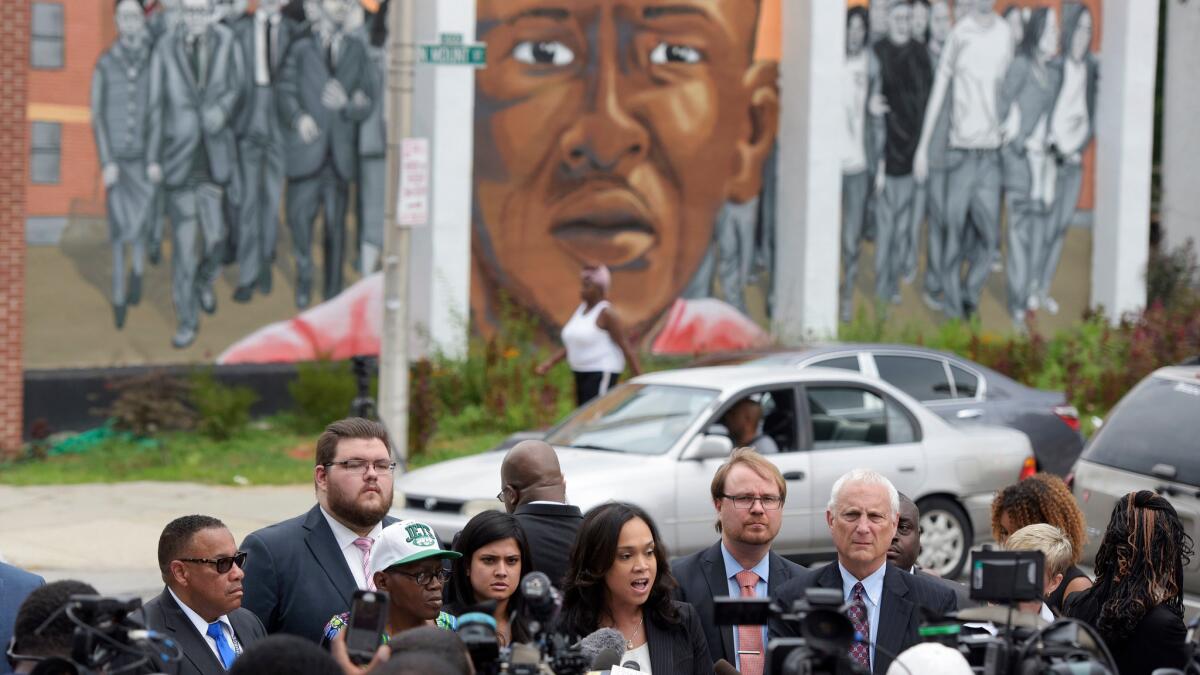Editorial: Reckoning for Baltimore’s police department resonates around the country

The U.S. Justice Department’s determination that Baltimore police engaged in unconscionably abusive and racially discriminatory practices for years is stunning but surely came as no surprise to residents whose complaints about police had long been brushed aside until the death last year of Freddie Gray.
The findings, detailed in a report released Wednesday, also ring true in other cities, where protests following police killings of unarmed African Americans have focused not just on the most recent needless deaths but on years of mistreatment by law enforcement officers.
Anger against police can turn into mistrust of the entire justice system.
They should sound uncomfortably familiar in Los Angeles as well. The Rampart scandal is best remembered for the crimes committed by then-LAPD Officer Rafael Perez, who was convicted of stealing cocaine from a police evidence locker and of shooting and framing Javier Ovando. Perez alleged that similar corruption was typical in his special anti-gang unit in the Rampart division, and his statements helped attract the attention of the Justice Department. But a consent decree and federal oversight came after the department’s findings of a pattern and practice of more mundane yet equally corrosive everyday LAPD practices that involved the regular abuse of African American and Latino residents.
In Baltimore, acquittals in recent months of three officers charged in the death of Gray, who died from injuries he sustained while being transported in handcuffs in a police van — and the dismissal of charges against three more — by no means constitute a clean bill of health for the police department. The Justice Department laid bare a host of practices and accompanying attitudes that are, or rather ought to be, unheard of in the 21st century. Of special note is a “zero-tolerance” policy that in practice can feel like a military occupation, especially when it is employed differently in African American neighborhoods than elsewhere.
Anger against police can turn into mistrust of the entire justice system when officers are acquitted, or not even charged at all, in assaults or killings of unarmed civilians. The Baltimore district attorney’s filing of criminal charges against police officers seemed like a new direction for prosecutors. The subsequent acquittals and dismissals, whether warranted or not, further stoke mistrust of the system.
Again, there are parallels in Los Angeles, this time connected with more recent events. It was refreshing news when Dist. Atty. Jackie Lacey charged LAPD Officer Richard Garcia with felony assault on Clinton Alford Jr. in a 2014 incident. But as reported in the Times Wednesday, the D.A. quietly agreed earlier this year to settle the case without jail time. That decision will do little to help the LAPD and the district attorney to win the full confidence of residents who feel under assault by police.
Baltimore, meanwhile, now faces the kind of consent decree under which Los Angeles operated for more than a decade. If it works there as it did here, there will be improvements, but they will not end the need for continuing scrutiny of police practices.
Follow the Opinion section on Twitter @latimesopinion and Facebook
More to Read
A cure for the common opinion
Get thought-provoking perspectives with our weekly newsletter.
You may occasionally receive promotional content from the Los Angeles Times.










